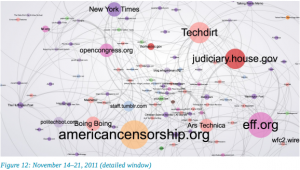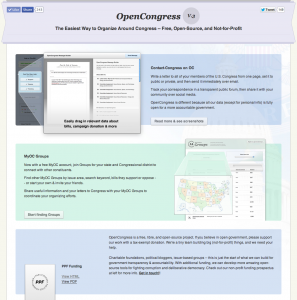Earlier this month, I wrote typically-overlong blog post about the amazing success of the Contact-Congress community #opendata project. Which builds on our non-profit, PPF’s open-source OpenCongress work to send digital messages to members of the U.S. Congress, generating invaluable open data about public feedback on legislation.
Here’s another version of what I see as the takeaways; comments welcome.
1. The current, closed model: individual activists write a letter to their members of Congress, which goes into a proprietary CMS on the Hill; or a petition with thousands of signatures of constituents gets faxed to a Congressional office, then goes into recycling bin, with virtually no follow-up for accountability
2. The possible, open & structured model: open-source tools to write all of your elected officials from any webpage, generating open-data in open data conventions. Directly from a news article page, write your U.S. rep’s office with questions, comments, or policy specifics.
3. The public-benefit potential: open data from constituent communications over the Web. Analyze public opinion on hot bills and important issues. Answer popular questions, collaboratively set priorities, and allocate resources empirically.
4. Open & structured communications with the people who represent us. For the first time. Be able to see what people are saying and feeling in every state, every Congressional district, every county, every city, every city council district, every local government jurisdiction.

Possible model: networked public sphere organizing. Slide from study by Prof. Benkler et al: http://goo.gl/EIZA4U
This would mean that the public would have an open hook  into the closed commercial CMS used by Hill staff to intake & handle digital communications (e.g. from existing webforms). It’s important that this stays open in its data convention, so that individual vendors don’t build business models off the basic ability to email your U.S. senators and representative. In any given Congressional district, then, the public would be able to have a view on 2,000 letters written on issue A, vs. 200 letters on issue B. It could have different tags – so you can send questions and expert testimony and personal stories, in addition to your individual message of support or opposition to a legislative initiative. Online petitions could be made more granular in Cong. districts & states, more specific to the legislative process, more actionable by signers & targets, more easily compared in their metrics.
And if this data is kept libre & open, it means the public could have an open CRMÂ for constituent communications with Congress. Your message would go in a public queue, where it would be routed & handled, creating a continual conversation with the offices of the people who represent you in D.C. You’ll be able to re-open an issue if a campaign contribution or issue group rating or vote doesn’t go the way you were promised, or as the news changes. Innovative new alert services & organizing tools on top of this open data can help make sure your communication gets results.
Our c3 non-profit PPF built a first-version of these open-source platforms with our Contact-Congress and MyOC Groups features for every U.S. state & all 438 Congressional districts. But we weren’t able to successfully fundraise to continue to provide them as free & open-source & open-data public resources on OpenCongress. In the meantime, startups and commercial vendors are catching-up with tools and services that won’t necessarily expose public opinion on the open web. We’ll have even further lost “neutrality” in digital communications to Congress – the current system, where wealthier issue-based groups contract with most-connected commercial CRMs, will play itself out again. Another shortfall for open standards on the open web.
What’s more, PPF created & launched these open-data projects in July 2011 – so for the past almost three years, along with the rise of Interactive news projects and data-driven online journalism and open-source advocacy tools, we could have been building and spreading these open standards. They simply weren’t actively supported. Open constituent communications could be in-place on major news sites, social networking services, neighborhood bulletin boards, fantasy baseball sites, celebrity gossip sites, Wikipedia pages, and more. But while there was funding support for transparency about bill actions in Congress, there wasn’t comparable resources supporting open-source engagement with Congressional offices – or put another way, there isn’t transparency around what people are actually acting on – at least until recently, when contact-Congress tools for advocacy groups is becoming more in-demand.
This has ramifications in-practice, as well. For example, over the past few years the House has held approx.  54 votes to repeal Obamacare. With an open CMS for constituent communications, the public could have seen if a comparable number of people in every Congressional district care about advancing other legislative priorities – for example, comprehensive immigration reform, or raising the minimum wage, or net neutrality. Congressional watchdogs in the networked public sphere could point out that yet another vote on repealing Obamacare is not a fruitful use of lawmaking bandwidth. With an open CRM, the letter from local immigration-reform leaders could move forward to an official public response from the legislative staff of the U.S. rep for that district – which could then be commented on, analyzed, followed-up on down later in the session. Even built into election pledges and campaign donation bounties. This would be far closer to public accountability “with teeth”.
Our c3 non-profit PPF has detailed proposals for open data conventions and user-friendly tools that can combine to create these open constituent communications. They’re likely to emerge soon from commercial vendors. Please fund our public-benefit work so we can get started, for the open-government movement. The public-benefit outcomes are enormous – imagine, write your members of Congress directly from a news article or social media webpage, and see your opinion in context in your District. Quantify and amplify your issues in the legislative queue.
This has been our non-profit vision since we founded OpenCongress –  help us build these tools, free & open-source – and crucially, with open-data! Email david at ppolitics.org, or davidrussellmoore on Gchat, davidmooreppf on Skype, to receive a copy of our non-profit funding prospectus. And this is just the start of the innovative organizing features we seek to build for productive everyday citizen activism, with even a tiny bit of funding support.

